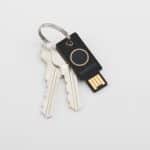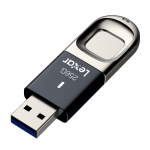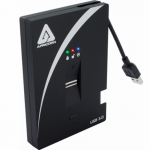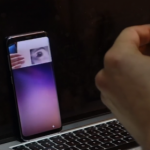Yubico previews its first ever biometric YubiKey at Microsoft Ignite

With system breaches coming thick and fast these days, it makes sense to take additional steps to protect your online accounts. One of the best ways to do this is with a YubiKey, a USB device which provides hardware-based two-factor authentication.
It’s a great -- and affordable -- way to protect your online accounts, and while you can also use it to log into a local account in Windows with the right software, you can’t use a Yubikey to log you into a Microsoft account (although the key can boost its security). That’s about to change. Today, at Microsoft Ignite, Yubico previewed its first ever security key with fingerprint recognition -- YubiKey Bio.
Mobile security platform combines biometrics and behavior to enhance security

Multi-factor authentication specialist Veridium is launching a new behavior analytics feature to better protect user identities and prevent malicious activity.
Incorporated in the VeridiumID authentication platform, InMotion increases the reliability of all native biometrics for authentication by pairing behavioral data captured on smartphones with users' biometrics, making it more difficult for malicious actors to spoof their fingerprints or faces to gain access to accounts.
Lexar unveils JumpDrive Fingerprint F35 for Windows, macOS, and Linux

Recently, we reported the Sentry K300 keypad flash drive from DataLocker Inc. What made that flash drive newsworthy? Well, besides its 256-bit AES hardware encryption, it has an industry first -- an OLED screen.
While entering a passcode into keypad on a flash drive is cool, Lexar has a new drive that makes it look like old hat. The JumpDrive Fingerprint F35, as it is called, uses biometrics for decryption. Much like the fingerprint reader found on a smartphone, you can use your finger to unlock the flash drive. How cool is that?
AI solution delivers accurate voice authentication

There's growing interest in biometric security solutions as passwords are increasingly seen as outmoded and at risk from phishing and other attacks.
Biometric solutions provider ID R&D is launching a new version of its voice biometric security solution, IDVoice. Enhancements to the product allow it to deliver what is claimed to be the industry's fastest and most accurate text-independent biometric verification.
Apricorn Aegis Bio 3.0: A simple, but super-secure biometric drive [Review]

If you want to keep your personal data safe and secure, then a hardware encrypted drive is your best bet. Secure drives, like the Apricorn Aegis Secure Key 3z, require you to enter a PIN into the integrated keypad to unlock the drive. These also come with a variety of security measures to make sure they can’t be brute forced.
If you prefer a different way of securing your data -- one that doesn’t require remembering a long PIN -- then you might prefer a biometric solution like the Aegis Bio 3.0. This a USB drive with a built-in finger reader. Unlocking the drive, and therefore your data, just involves swiping your finger down the AuthenTec TouchStrip sensor.
Intel Online Connect lets you log in on popular websites with just your fingerprint

Using passwords to get online may soon be a thing of the past thanks to a new launch from Intel.
The computing giant has revealed that its Intel Online Connect service will now ship in all 7th and 8th-generation Core processors, allowing users a smoother and easier way to get online quickly using just a fingerprint -- with users of Lenovo's latest PC devices the first to benefit from safer browsing.
How the authentication landscape is changing [Q&A]

Recently there has been much talk of the death of the password and a switch to other forms of authentication, like biometrics, which are seen as more secure.
But is biometric security a complete answer, and do we risk swapping usability for security? We spoke to Perry Chaffee, vice president of strategy at password-less security company WWPass to find out about the latest trends in authentication.
New biometric authentication platform eliminates the need for passwords

Passwords are increasingly being seen as inadequate for securing systems and developers are seeking better alternatives. A new SaaS platform from Pramati Technologies is aimed at providing strong authentication for mobile and web-based applications using existing device capabilities.
ThumbSignIn enables enterprises and service providers to deploy strong authentication solutions that reduce reliance on passwords and protect against a range of attacks.
UK consumers increasingly prefer biometric authentication

New research has shown that biometrics is quickly becoming the preferred method of authentication among British consumers.
A report from Mastercard/University of Oxford report, has found that more and more of us across the UK are happy to use biometric security processes such as iris scans or fingerprint authentication. The news has been welcomed by Fujitsu, which has been at the forefront of biometric development for some time.
Samsung's Galaxy S8 iris scanner is easily defeatable

If you want to secure your Samsung Galaxy S8, relying on the iris scanner to keep it locked is not the best idea. That's because it can be easily fooled using just a printed photo and a contact lens.
This reinforces the belief that biometric authentication is -- at least for now -- less secure than traditional options, like PINs and passwords, which have the advantage of not being tied to a physical trait that can be easily exploited by hackers, thieves or the authorities.
Microsoft is replacing the password -- what's taking its place?

It was supposed to have died a long time ago, but, for a near-cadaver, the password has managed to hold onto its last breath for over two decades. Bill Gates declared passwords passé way back in 2004, but it was only late in April that the company he founded introduced a replacement for the outmoded authentication system.
For years, organizations have sought to educate employees about the importance of secure passwords and of resisting phishing attacks -- and both efforts have failed. A Verizon report indicates that 63 percent of confirmed data breaches involved leveraging weak/default/stolen passwords in 2016. Meanwhile, a new report from Proofpoint says that phishing and similar attacks using e-mail were up 45 percent in the last quarter of that year. Clearly, the constant haranguing by security teams of employees to change their passwords and make them more complicated, as well as their pleas not to click on suspicious links/attachments, are falling on deaf ears.
Mastercard introduces card with built-in fingerprint scanner

Mastercard has unveiled a new card that comes with a fingerprint scanner, allowing consumers to make purchases without the card ever leaving their hands. It builds on fingerprint scanning technology currently available in smartphones, and can be used at EMV terminals worldwide, the company says.
The technology was tested in South Africa, in two separate trials. One was with Pick n Pay, while the other one was Absa Bank, a subsidiary of Barclays Africa.
Fujitsu announces six new enterprise devices

Fujitsu has announced six new enterprise devices on six different product series, offering faster machines and more security. There's the new 10.1-inch Arrows Tab Q507/P-SP tablet, a new Notebook Lifebook, two ESPRIMO models, a 17.3-inch Celsius H970 mobile workstation, and the Futro MU937 mobile notebook device (which Fujitsu claims is the world's lightest).
What's particularly interesting about the Arrows device is that, for the first time, it comes with Fujitsu's Biometric Authentication Slide Passport functionality. This biometric authentication service allows users to log in using the palm of their hand.
From spoofing to iris scanning -- the future of biometrics

As we enter the first part of the new year, we’re setting our resolutions (or perhaps already breaking them), and reflecting on 2016. We witnessed many highs and lows last year, and it seems it’s trendy right now to bemoan everything that happened. This is no different in the security world. We saw some of the biggest -- and highest profile -- breaches of all time (DMC and Yahoo, just to name a few) and nearly all of them involved compromised, weak or reused passwords.
Everyone can agree that passwords are no longer adequate for protecting information online: even the most complicated passcodes can be broken relatively swiftly with a sophisticated algorithm -- or a specially targeted spoofing email. In an attempt to combat this, companies have been adopting new approaches, like tokens, OTPs and multi-factor authentication -- but many experts are pointing to biometrics as the next big thing -- especially for industries rife with risk, like finance, healthcare and government.
Adding facial recognition to mobile helps reduce fraud

Doing more of our day to day transactions online increases the risk of falling victim to some kind of fraud. Increasingly therefore companies are turning towards biometrics to ensure users are who they say they are.
Digital verification company Jumio is adding biometric facial recognition to its Netverify product to verify users on mobile devices.
Recent Headlines
BetaNews, your source for breaking tech news, reviews, and in-depth reporting since 1998.
© 1998-2025 BetaNews, Inc. All Rights Reserved. About Us - Privacy Policy - Cookie Policy - Sitemap.